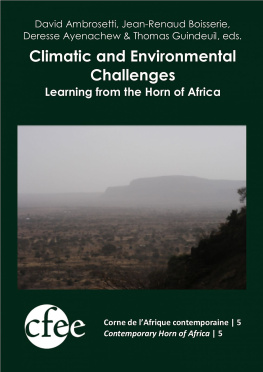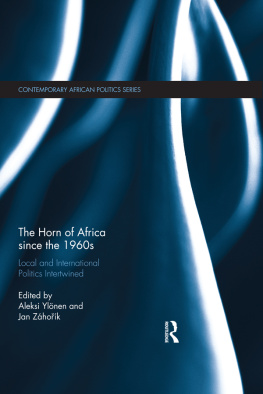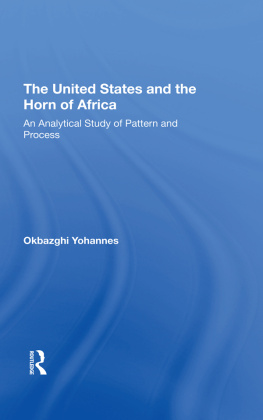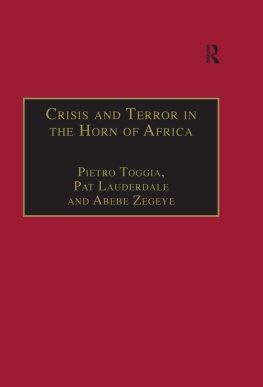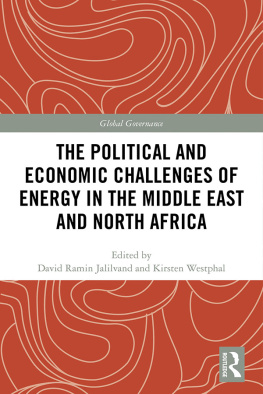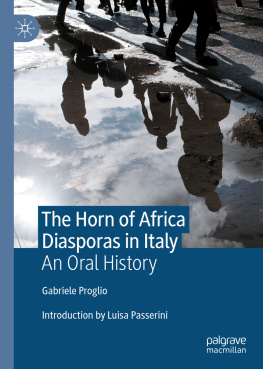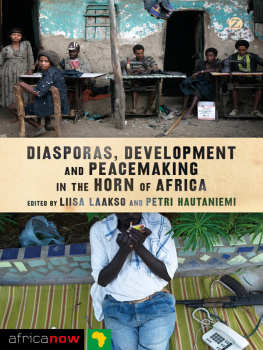David Ambrosetti - Climatic and Environmental Challenges: Learning from the Horn of Africa
Here you can read online David Ambrosetti - Climatic and Environmental Challenges: Learning from the Horn of Africa full text of the book (entire story) in english for free. Download pdf and epub, get meaning, cover and reviews about this ebook. year: 2019, publisher: Centre français des études éthiopiennes, genre: Romance novel. Description of the work, (preface) as well as reviews are available. Best literature library LitArk.com created for fans of good reading and offers a wide selection of genres:
Romance novel
Science fiction
Adventure
Detective
Science
History
Home and family
Prose
Art
Politics
Computer
Non-fiction
Religion
Business
Children
Humor
Choose a favorite category and find really read worthwhile books. Enjoy immersion in the world of imagination, feel the emotions of the characters or learn something new for yourself, make an fascinating discovery.
- Book:Climatic and Environmental Challenges: Learning from the Horn of Africa
- Author:
- Publisher:Centre français des études éthiopiennes
- Genre:
- Year:2019
- Rating:4 / 5
- Favourites:Add to favourites
- Your mark:
- 80
- 1
- 2
- 3
- 4
- 5
Climatic and Environmental Challenges: Learning from the Horn of Africa: summary, description and annotation
We offer to read an annotation, description, summary or preface (depends on what the author of the book "Climatic and Environmental Challenges: Learning from the Horn of Africa" wrote himself). If you haven't found the necessary information about the book — write in the comments, we will try to find it.
David Ambrosetti: author's other books
Who wrote Climatic and Environmental Challenges: Learning from the Horn of Africa? Find out the surname, the name of the author of the book and a list of all author's works by series.
Climatic and Environmental Challenges: Learning from the Horn of Africa — read online for free the complete book (whole text) full work
Below is the text of the book, divided by pages. System saving the place of the last page read, allows you to conveniently read the book "Climatic and Environmental Challenges: Learning from the Horn of Africa" online for free, without having to search again every time where you left off. Put a bookmark, and you can go to the page where you finished reading at any time.
Font size:
Interval:
Bookmark:

- DOI: 10.4000/books.cfee.101
- Publisher: Centre franais des tudes thiopiennes
- Place of publication: Addis-Abeba
- Year of publication: 2016
- Published on OpenEdition Books: 28 July 2016
- Serie: Corne de lAfrique contemporaine / Contemporary Horn of Africa
- Electronic ISBN: 9782821873001

http://books.openedition.org
AMBROSETTI, David (ed.) ; et al. Climatic and Environmental Challenges: Learning from the Horn of Africa. New edition [online]. Addis-Abeba: Centre franais des tudes thiopiennes, 2016 (generated 23 avril 2019). Available on the Internet: . ISBN: 9782821873001. DOI: 10.4000/books.cfee.101.
Centre franais des tudes thiopiennes, 2016
Terms of use:
http://www.openedition.org/6540
In the prospect of the COP21 held in Paris in December 2015, the French Centre for Ethiopian Studies (CFEE) organised a scientific conference on environmental and climatic changes in the horn of Africa, with a decisive financial support of the Institut franais (Fonds dAlembert), Paris. The conference was part of a larger event, called the Road to Paris and organised by the French Embassy to Ethiopia and the Horn of Africa Regional Environment Centre and Network (HoA-REC&N), Addis Ababa University, in HoA-REC&N headquarters at Gullele Botanic Gardens, Addis Ababa, from 7 to 9 April 2015.
In this event, our first purpose was to set aside from the pressure of short-term and policy-oriented concerns raised by the international bureaucracies and bilateral donors, as to try to explore diverse, cross-disciplinary dimensions related to environmental change in the region in a wider way, wider in time and also wider in the elements observed. In a way, the Road to Paris event has also showed, with the various stakeholders and speakers it has gathered, that the issue of climate change has solidified automatic discourses, supporting wishful intentions and thinking, and clearly embedded in the building of professional opportunities and international careers. These discourses, indeed, are everything but close to the reality observed on the ground.
In this new, competitive, social field, priority may not be easily given to scientific exploration that is not directly policy-oriented and that requires a longer time to produce strong data than what the political and bureaucratic agendas allow. One could not state, though, that interest for science is totally absent in these arenas on climate change. But, invariably, public expectations appear to be much too high in scope and in time, compared to what intellectual curiosity and scientific processes and protocols can produce on a day-to-day basis. Improving awareness on environmental changes should start here: to give a better understanding on the complexity and multiplicity of factors involved in the relation between human evolution, societal choices and developments, and natural environments. The French Centre for Ethiopian Studies (CFEE) in Addis Ababa was quite well equipped to initiate, with its partners, such a cross-disciplinary exploration.
Director, CFEE
CNRS (CFEE & IPHEP)
Debre Berhan University/Associate researcher at CFEE
Project officer, CFEE/Associate researcher at IMAF
This publication has been supported by t he French Embassy to Ethiopia and the Institut franais (Fonds d'Alembert).
In the prospect of the COP21 held in Paris in December 2015, the French Centre for Ethiopian Studies (CFEE) organised a scientific conference on environmental and climatic changes in the horn of Africa, with a decisive financial support of the Institut franais (Fonds dAlembert), Paris. The conference was part of a larger event, called the Road to Paris and organised by the French Embassy to Ethiopia and the Horn of Africa Regional Environment Centre and Network (HoA-REC&N), Addis Ababa University, in HoA-REC&N headquarters at Gullele Botanic Gardens, Addis Ababa, from 7 to 9 April 2015.
In this event, our first purpose was to set aside from the pressure of short-term and policy-oriented concerns raised by the international bureaucracies and bilateral donors, as to try to explore diverse, cross-disciplinary dimensions related to environmental change in the region in a wider way, wider in time and also wider in the elements observed. In a way, the Road to Paris event has also showed, with the various stakeholders and speakers it has gathered, that the issue of climate change has solidified automatic discourses, supporting wishful intentions and thinking, and clearly embedded in the building of professional opportunities and international careers. These discourses, indeed, are everything but close to the reality observed on the ground.
In this new, competitive, social field, priority may not be easily given to scientific exploration that is not directly policy-oriented and that requires a longer time to produce strong data than what the political and bureaucratic agendas allow. One could not state, though, that interest for science is totally absent in these arenas on climate change. But, invariably, public expectations appear to be much too high in scope and in time, compared to what intellectual curiosity and scientific processes and protocols can produce on a day-to-day basis. Improving awareness on environmental changes should start here: to give a better understanding on the complexity and multiplicity of factors involved in the relation between human evolution, societal choices and developments, and natural environments.
The French Centre for Ethiopian Studies (CFEE) in Addis Ababa was quite well equipped to initiate, with its partners, such a cross-disciplinary exploration. In its 25-year long history (not mentioning here its own prehistory bringing back to the permanent presence of French archaeologists in Ethiopia from the 1950s till 1974), it has been leading and supporting research in the Horn of Africa in various topics of direct or indirect interest for the matter of environmental changes, notably:
- the deep past of the humankind and its environments, thanks to the paleo-anthropological mission Jean-Renaud Boisserie has been leading on the Shungura Formation (Southern Omo) since 2006, in direct collaboration with the Authority for Research and Conservation of Cultural Heritage (ARCCH) of the Federal Democratic Republic of Ethiopia;
- the medieval and modern history of Ethiopia, thanks to our long-lasting collaboration with Deresse Ayenachew and the department of history and management of cultural heritage he is leading at Debre Berhan University, also with Margaux Herman through her historical investigation on women and gender in the Ethiopian history;
- as well as more contemporary and socio-political issues, such as the administration of land and the effects of the current constitution of the cadastre on the management of the Ethiopian natural parks, studied by Mehdi Labzae, the making of the Ethiopian heritage as a tool of national conscience awareness supported by foreign experts, explored here by Thomas Guindeuil, or the intervention of international organisations and their relations with the states in the region, studied by David Ambrosetti.
Font size:
Interval:
Bookmark:
Similar books «Climatic and Environmental Challenges: Learning from the Horn of Africa»
Look at similar books to Climatic and Environmental Challenges: Learning from the Horn of Africa. We have selected literature similar in name and meaning in the hope of providing readers with more options to find new, interesting, not yet read works.
Discussion, reviews of the book Climatic and Environmental Challenges: Learning from the Horn of Africa and just readers' own opinions. Leave your comments, write what you think about the work, its meaning or the main characters. Specify what exactly you liked and what you didn't like, and why you think so.

